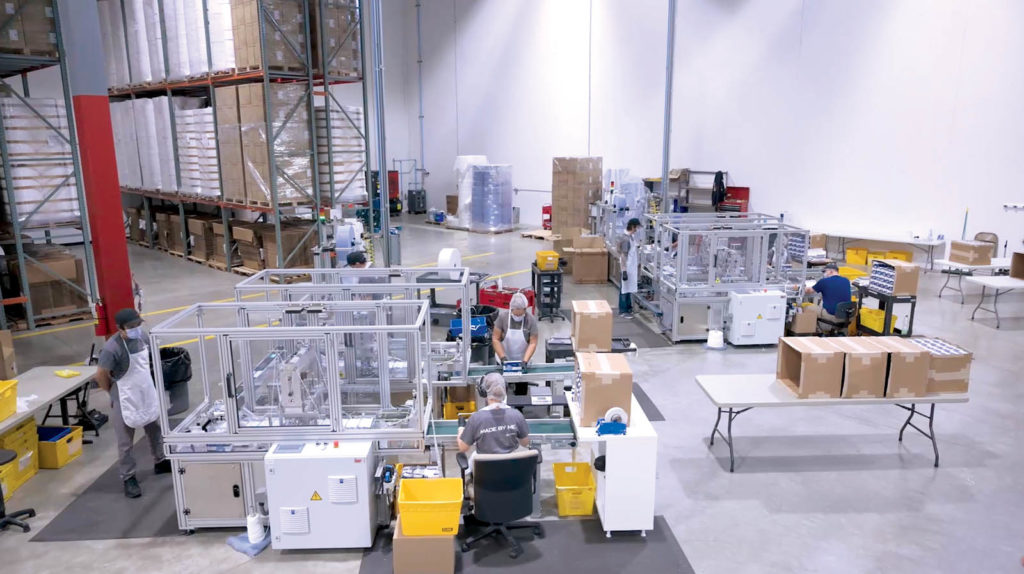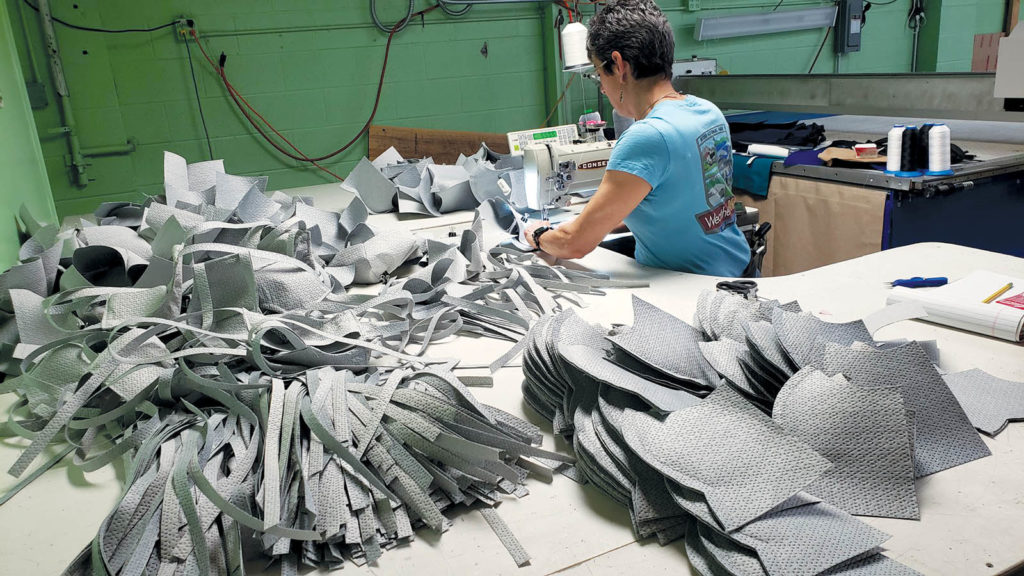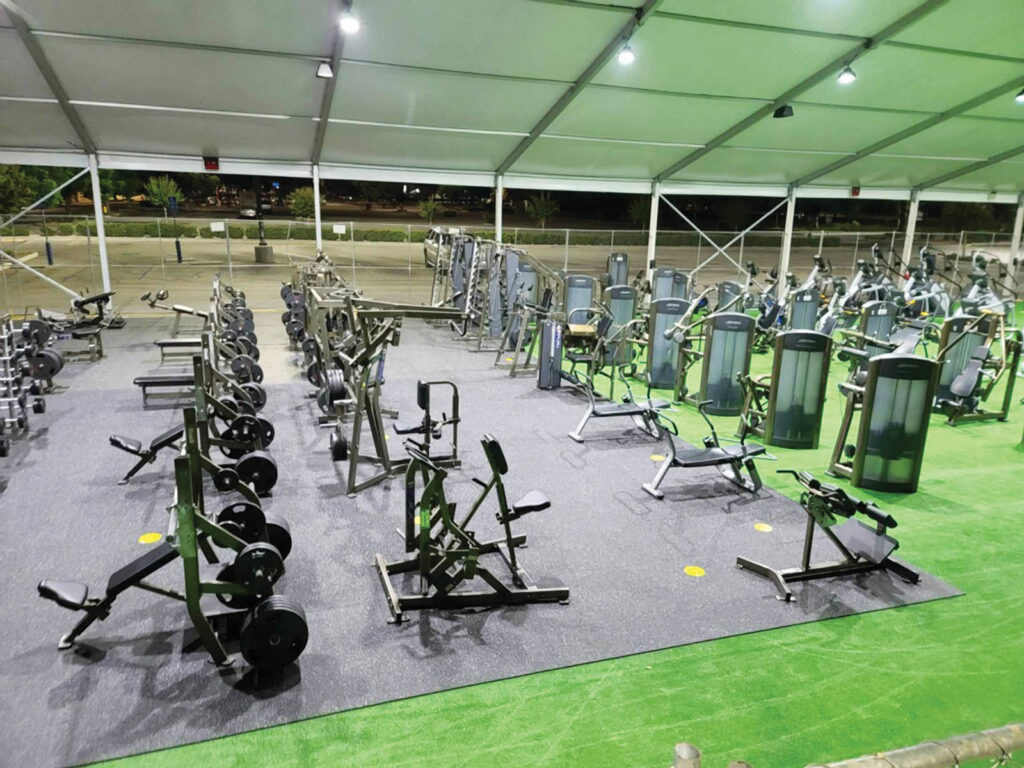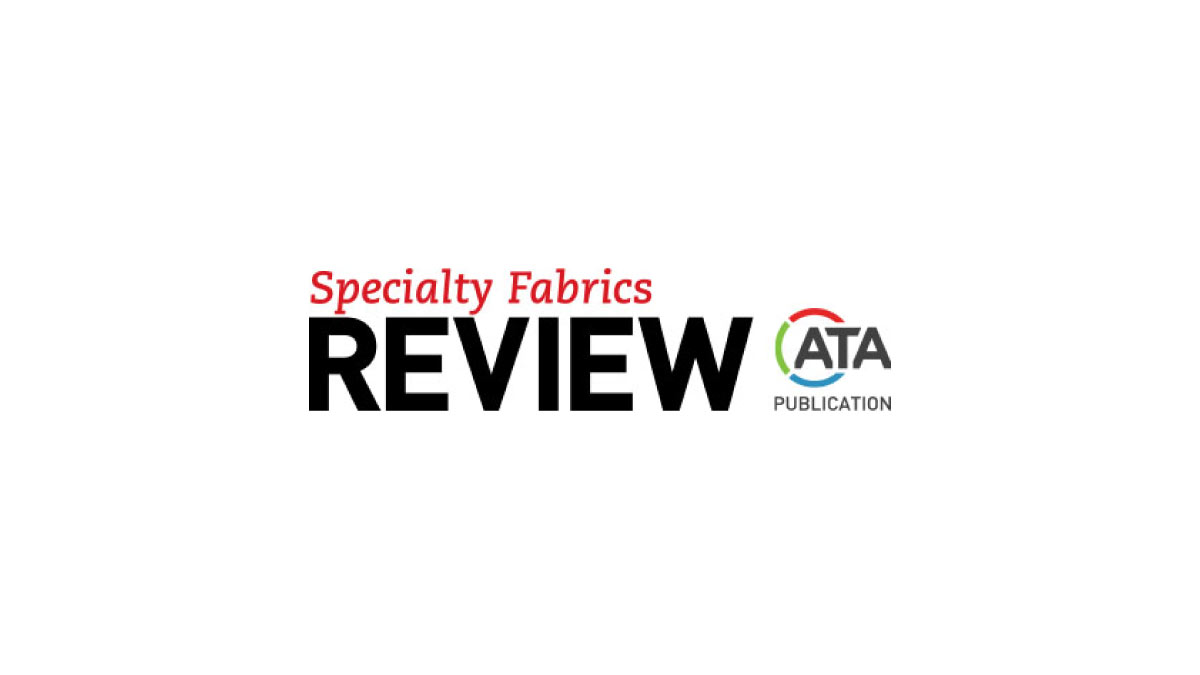COVID-19 made an abrupt entrance in 2020, catching almost everyone off guard. It quickly became clear that waiting it out wasn’t an option for most businesses. Many pivoted, looked for opportunities and took calculated risks to keep their employees working and the bottom line healthy during what has proved to be a challenging, unpredictable and, in some cases, rewarding time.
Mass masks fast
“It didn’t take long for us to be impacted because shows started canceling left and right,” says Heidi Katherine, senior vice president global design and development at Moss Inc., a Franklin Park, Ill.-based manufacturer of tensioned fabric structures and graphic displays for trade shows and events, retail stores and corporate offices.
Initially, the company kept its sewers busy by hand-sewing face masks for employees and customers who couldn’t find them elsewhere. High-quality masks were in short supply, and demand was exploding, creating a market opportunity, at least for the immediate future. But time was of the essence, and Katherine knew hand-sewing wasn’t going to cut it. The company needed a machine, processes, and supply chains that didn’t exist. She was undaunted. “Our expertise is solving problems and making crazy ideas manufacturable. If we could figure out how to mount an antique wagon on a wall for Kraft, I knew we could figure out how to mass-produce masks,” Katherine says.
Moss international affiliates proved critical. The executive team worked with its counterparts in Germany and engineers at the Fraunhofer Institute to design and build a machine that would produce a high volume of consistent-quality surgical masks at a reasonable cost.
Moss’s purchasing team worked with its global network of contacts to navigate unfamiliar supply chains for hard-to-procure materials such as spunbond polypropylene nonwoven fabrics. “We were competing with big players like 3M and Honeywell for these materials and had to convince the suppliers that we were legitimate,” Katherine explains.
All told, it took three months for the company to go from hand-sewing masks to mass-producing 750,000 facemasks per week in its Illinois plant— an unprecedented time frame.
Two employees from Germany were trained in the requirements for CE mark quality management. They became experts on the new machine and material handling procedures such as keeping items sterile, a new area of expertise necessary to handle personal protective equipment (PPE), and trained the U.S. team via recurring virtual meetings once the equipment arrived in Illinois.
Press releases and a refocused sales strategy to hospital purchasing organizations helped get the word out. Sales were strong, benefiting from a bias toward local suppliers. “U.S companies had a higher level of trust purchasing masks and other protective equipment from a domestic manufacturer,” Katherine notes.
Additional obstacles came with understanding emergency use authorization criteria and Food and Drug Administration (FDA) medical device requirements for surgical-grade masks and face shields.
Where this will go isn’t totally clear. The PPE market and supply have stabilized, but Moss has planned for various market scenarios knowing that could change. Valuable lessons from 2020 are certain, though, according to Katherine. “This is the most intense collaborative problem solving we’ve ever done, across all levels of the company, and I think we realized how powerful it is. That communication is here to stay regardless.”

Open, agile and growing
For Norcross, Ga.-based custom awning company Peachtree Awnings and sister company Tennessee Awnings, of La Vergne, Tenn., the pandemic strengthened both the bottom line and the courage of their convictions. Owner Barry Adams reflects, “It wasn’t business as usual, but we protected our employees’ health and livelihood and grew our revenue. In fact, 2020 was our best year yet.”
Peachtree and Tennessee Awnings, determined not to cower in the face of dismal media reports, stayed engaged and focused during the early months. Adams is quick to point out that they also benefited from essential business status in Georgia and Tennessee: “We were fortunate to be allowed to stay open. Some of our colleagues in other states weren’t.”
Adams immediately applied for and received a federal Paycheck Protection Program (PPP) loan to ensure the companies wouldn’t have to reduce hours or lay off any of its 25 employees. Then they adapted—implementing PPE measures such as wearing face masks and taking temperatures at facilities and worksites. They began connecting with existing commercial customers and aggressively pursuing new ones to see how they could help them adapt to the new normal—creating or expanding outdoor dining for bars, cafes and restaurants. That accounted for a significant amount of business, which Adams thinks will continue: “Demand for outdoor dining was and will continue to be significant, and I think national [food and beverage] chains will be building this into their blueprints going forward.”
At the same time, Peachtree and Tennessee Awnings also saw an increase on the residential side of their retractables business, as homeowners spent money to expand their outdoor spaces. Home improvement represents a smaller part of the companies’ overall business, and Adams says they could’ve done more. “Because our business is mostly commercial, we might’ve missed the boat a bit on that.”
Peachtree and Tennessee Awnings also moved forward with a new powder coating capability that had been in the works pre-pandemic. This necessitated significant investment in equipment and a move to a larger, 30,000-square-foot facility in Atlanta. Adams admits that while his risk tolerance is pretty high, he remains vigilant. “I have my ear to the ground almost daily, checking but continuing to move forward, expand and try to grab a bigger share of the pie,” he says.
Serve, support and refocus
It’s possible that a previous career in the military prepared Chandler Clark, owner of custom canvas shop Signature CanvasMakers based in Hampton, Va., to mobilize quickly when the pandemic hit. Norfolk, just outside of Hampton, is home to a large naval base, and when the U.S. Department of Defense issued guidance in early April 2020 advising Navy personnel to wear face masks, Clark knew his company could help. “Pivoting to manufacturing PPE was a logical decision. It allowed us to keep our people employed, serve the community and supply protective face coverings to thousands of Navy sailors and government contractors from Virginia to Florida.”
Producing masks meant establishing new processes, researching and securing materials, determining pricing, and creating a temporary workforce of sewers to get the job done. At the same time, Signature CanvasMakers dealt with employees’ anxiety and COVID-19-related problems like childcare while trying to be compassionate and compliant with state and federal guidelines and the Families First Coronavirus Response Act (FFCRA). Clark says, “While most of our employees’ challenges were legitimate, we did have some who chose to try to take advantage of the situation and our business. We enlisted the help of a fractional human resources professional to ensure that we were handling situations correctly and were responding appropriately.”

PPE production ended up being a relatively short operation for Signature CanvasMakers. Once summer hit, the company was back to normal operations, busy with marine canvas orders. But the pandemic made Clark realize Signature CanvasMakers had been operating without a long-term plan and had drifted from its mission. “The beginning of the pandemic was a low point because we had lost focus on our priorities. We were growing, but we hadn’t prepared our business to scale effectively. We vowed never to be in that position again and have since created a three-year growth plan. We’re focused and moving forward with purpose and clarity.”
Leveraging tenting expertise
Leveraging core capabilities and inventory has kept Valencia, Calif., 24/7 Events afloat and even thriving during the pandemic. Previously reliant on the kind of large gatherings that were now prohibited—weddings, parties, conferences and corporate events—the company needed to regroup quickly once COVID-19 hit. “We immediately started brainstorming about how we were going to survive this as a company and keep our employees working,” says Stacie House, director of business development. House developed a sales strategy to give the team direction, targeting local government agencies and hospitals to offer tenting resources for testing and overflow patient care. But business was slow at that early stage because the need wasn’t clear and what was open and closed was changing weekly.
Initially, 24/7 had to lay off a few employees (since rehired) and received PPP assistance to help keep them going during the first month of event cancellations. Later, when it became clear that small businesses like gyms and restaurants would only be allowed to be open outdoors and COVID-19 cases surged, overwhelming emergency rooms, 24/7’s phone started ringing off the hook. “It’s been a roller coaster for our clients and us, especially in LA County. We’ll put up an amazing outdoor structure for a restaurant client to help their business thrive only to find out they need to shut down again. We are then concerned for their businesses and our own, and the stakes are even higher with our healthcare customers,” says House.

The company also created guides and protocols for safe distancing within tented spaces to make people feel comfortable, working with partners on touchless registration and investing in hand sanitizing stations and UV cleaning equipment.
A key realization from 2020 was recognizing that even though 24/7 didn’t know anything about the health care field or hospitals or other businesses it hadn’t worked with in the past, that didn’t matter. The company understood outdoor shelter and could bring that expertise to clinics and businesses that were desperate. “There’s opportunity everywhere, and that’s a key learning for our sales team,” House says. “We have a great team and are helping some of these small businesses stay alive. That has been very satisfying.”
Laurie F. Junker is a freelance writer based in Minneapolis, Minn.
SIDEBAR: Stories
What is one moment from the past year that you will never forget?
I think it was the realization of everything shutting down. I was in Seattle on business and it was the original epicenter. I got real sick. It turned out not to be COVID, but I had to spend a lot of time apologizing. Then I got home and watched the news and knew—we’re shutting down. I sent an email out to staff. “This is it, get your stuff.” Boom.
–Michael Lavroff, President, Jason Mills LLC
Sitting in my living room trying to figure out what in the world it meant for a state to “shut down” and what that meant for my business, how I would communicate with my employees and take care of them, and how I would be able to take care of my customers.
–Jonathan Palmer, CEO, Autometrix Inc.
We’re part of people’s special times in life, but we often don’t get to see the tangible benefits of what we do. Working with a couple of different hospitals, you see a small sigh of relief come over a nurse’s face or a small child who has a warm place to sit.… Overwhelming quite honestly, connecting with a community. Being a part of that has been significant for us.
–Stacie House, Director of business development, 24/7 Events
One of my favorite moments from the past year was getting our team together for the National ESOP (employee stock ownership plan) Month in October. We planned a bunch of virtual activities and our team was engaged and having fun together. After months of uncertainty, it was a validating moment that this new normal was working for us. At the same time we were prepping for IFAI Virtual Expo 2020 and had the feeling that everyone was figuring out how to move forward. While I know there is still a lot of work to do to get everyone back to normal, it showed our team’s and our industry’s resiliency and gave me a lot of confidence for the future.
–Chris Fredericks, CEO, TVF
I will never forget getting a call from the White House, from Dr. Peter Navarro (assistant to the president, director of trade and manufacturing policy) asking what our industry could do and how quickly we could do it in terms of PPE production. That call had a huge cascading impact across all industry associations. It was our call to help. We surveyed who could do what and got more than 1,000 responses in a day. It was a good reminder how this industry is a fighter—we’re here and we answered the call.
–Kimberly Glas, president and CEO, NCTO
The moment we figured out what is actually required to get an FDA permit, I personally became aware of every label I came into contact with.
–Heidi Katherine, Senior vice president global design and development, Moss Inc.
The phone rang in April and on other end was Rear Admiral John Polowczyk [supply chain task force lead at the Federal Emergency Management Agency (FEMA)], calling me directly. That was a pretty stunning moment. That showed me how serious things were. He had been pulled out of the Pentagon and [was appointed to] FEMA. He was the point man in charge of getting [PPE] supplies directed and distributed. You see him on the briefing with the vice president and you start to realize how important this stuff is.
–Dave Rousse, president, INDA




Leave A Comment